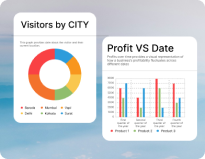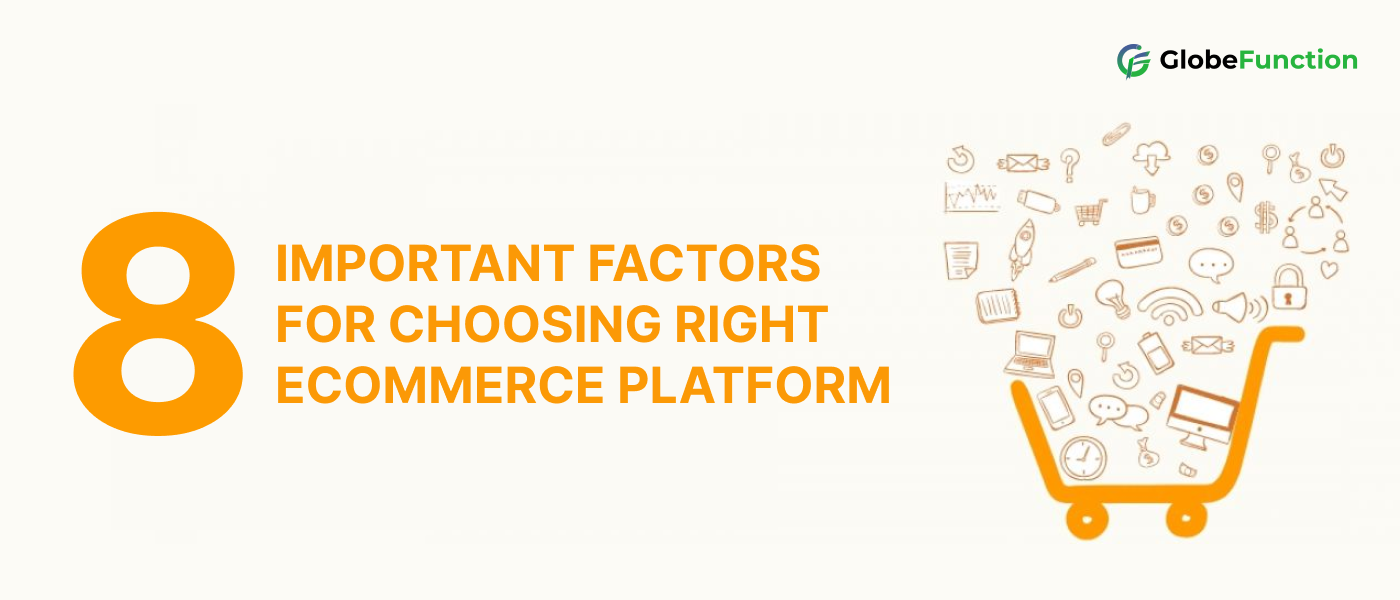You must first create a website for your store if you’re eager to follow a similar route and enter the eCommerce industry. When creating an eCommerce website, there are two options available. The first is to hire a web developer, but this can impede the rapid expansion of your company due to the associated costs. Alternatively, you can choose an eCommerce platform that has already been developed, which will save you money and effort when developing the website for your store.
Selecting the best eCommerce platform for your company can be challenging because there are many options that appear to offer comparable features. In light of this, we are providing you with a list of some crucial considerations that will help you select the best platform for your online store.
1. Safety
If customers are unsure that your eCommerce site will protect their financial information from hackers and data thieves, they won’t purchase anything from it. Because of this, the platform you select needs to have all the necessary security features, such as data backups, fraud prevention, SSL (Secure Sockets Layer) certificates, and PCI (Payment Card Industry) compliance. In order to detect potential security risks, the platform should also conduct security audits. In order to shield clients from the dangers, the appropriate adjustments can be made.
It is recommended that you select a platform with object-oriented programming built in, as these platforms come with embedded security protocols.
Two well-known platforms that emphasize two-factor authentication to lessen website vulnerability are Magento and Shopify. Security plugins offer an extra layer of protection for platforms that don’t have multi-factor authentication for protecting sensitive information.
2. Search Engine Optimization (SEO)
Customers won’t visit your website unless they are able to locate your store through search engines when looking for products similar to what you sell. SEO (Search Engine Optimization) is necessary to raise your site’s search engine ranking and visibility.
Because of this, the platform you select should have a number of SEO-related features, such as the ability for users to add a blog to their website, use their own domain name, write product meta descriptions, enable Google site maps, and so on. The platform’s inclusion of these features will directly affect the SEO rankings of your website.
Some excellent SEO-friendly eCommerce platforms are Woocommerce, Onveos, Magento, and OpenCart. The other three complement Onveos’ independent SEO components, which bolster inbound marketing campaigns.
It is recommended that you select a platform with object-oriented programming built in, as these platforms come with embedded security protocols.
Two well-known platforms that emphasize two-factor authentication to lessen website vulnerability are Magento and Shopify. Security plugins offer an extra layer of protection for platforms that don’t have multi-factor authentication for protecting sensitive information.
3. The use of responsive web design
eCommerce stores cannot afford to ignore this significant portion of mobile-using customers, as over half of American shoppers made purchases through their mobile device in 2019. These clients ought to be able to simply access their website and make purchases from their mobile device.
eCommerce businesses will need to manage different marketing campaigns, banners, product information, catalogs, etc. if they decide to have separate desktop and mobile websites. As a result, they will have to spend more money and use more resources.
A responsive web design, which automatically modifies a site according to the screen sizes of various devices including desktops, laptops, mobiles, and tablets, is a better and more affordable option than having separate desktop and mobile sites. Therefore, responsive web design enables you to give users an excellent experience on any device.
Selecting a platform that facilitates responsive web design is the right choice. The responsive themes and templates available for the Magento, WooCommerce, and Shopify platforms enable the creation of vertically stacked websites. Users can also directly edit HTML and CSS with Shopify. Additionally, they have the ability to alter the colors, sizes, and positions of any element on the platform page.
It is recommended that you select a platform with object-oriented programming built in, as these platforms come with embedded security protocols.
Two well-known platforms that emphasize two-factor authentication to lessen website vulnerability are Magento and Shopify. Security plugins offer an extra layer of protection for platforms that don’t have multi-factor authentication for protecting sensitive information.
4. Accommodates Various Sales Channels
An online retailer can boost sales by providing goods and services through various channels. Thus, among other selling channels, you ought to pick a platform that lets you sell goods and services on Facebook Messenger, Instagram, and Amazon.
Among the top multi-channel eCommerce platforms are Shopify, WooCommerce, BigCommerce, Magento, and PrestaShop. These platforms help you create diversified selling options in online marketplaces and increase your revenue by enabling centralized management of your inventory data.
It is recommended that you select a platform with object-oriented programming built in, as these platforms come with embedded security protocols.
Two well-known platforms that emphasize two-factor authentication to lessen website vulnerability are Magento and Shopify. Security plugins offer an extra layer of protection for platforms that don’t have multi-factor authentication for protecting sensitive information.
5. Consolidations
Everything needed to operate an online store is included in an eCommerce platform. However, in order to provide certain essential features like tax calculators, payment gateways, accounting, email marketing tools, shipping apps, etc., a platform must have integrations and plugins added.
All eCommerce platforms share a set of required integrations and plugins that you will encounter. However, you ought to go for a platform that offers plugins and integrations relevant to your industry and has a vibrant community that works round the clock to fix bugs and enhance the platform.
It is recommended that you select a platform with object-oriented programming built in, as these platforms come with embedded security protocols.
Two well-known platforms that emphasize two-factor authentication to lessen website vulnerability are Magento and Shopify. Security plugins offer an extra layer of protection for platforms that don’t have multi-factor authentication for protecting sensitive information.
6. Technical Assistance
Unwanted events, such as server crashes, outages, and software malfunctions, can happen at any time and prevent users from visiting your website and completing transactions. These will not only cost you money, but they will harm the perception of your brand.
You need quick technical assistance from your eCommerce platform in order to resolve these issues quickly and get your store operating normally once more.
This is why you ought to choose a platform that offers assistance precisely when you need it. Don’t forget to ask these questions of the customer support agents on a platform before choosing it. Does technical support have set hours or is it available around-the-clock? How will they offer assistance—over the phone, online, via chat, through self-service, etc.? What is the cost of each level of support that they provide?
It is recommended that you select a platform with object-oriented programming built in, as these platforms come with embedded security protocols.
Two well-known platforms that emphasize two-factor authentication to lessen website vulnerability are Magento and Shopify. Security plugins offer an extra layer of protection for platforms that don’t have multi-factor authentication for protecting sensitive information.
7. Flexibility
You’ll see growth in your eCommerce business over time. As a result, you ought to pick a platform that grows with your company. Furthermore, the platform shouldn’t impose outrageous costs on you for adding more features and storage to accommodate your growing business requirements.
It is recommended that you select a platform with object-oriented programming built in, as these platforms come with embedded security protocols.
Two well-known platforms that emphasize two-factor authentication to lessen website vulnerability are Magento and Shopify. Security plugins offer an extra layer of protection for platforms that don’t have multi-factor authentication for protecting sensitive information.
8. Price
One of the most crucial factors to take into account when selecting a platform for your store is pricing. An eCommerce platform’s cost is determined by a number of variables, including custom development, setup configuration, self-hosted vs. hosted, maintenance, and design.
The costs of various eCommerce platforms vary.
Globefunction is the best option for entrepreneurs who need a lot of features and add-ons for their app, but Volusion offers a more sales-oriented experience. While BigCommerce is ideal for search engine optimization, 3dcart has many helpful features and creates and runs eCommerce stores quite well.
You can select the platform that best fits your budget by weighing the costs of different options against their benefits and drawbacks.
Conclusion
Selecting the best eCommerce platform from the start is essential to the expansion and seamless operation of your company. Should you make the incorrect choice, you will eventually need to move to a new eCommerce platform, which could be an expensive, time-consuming, and frustrating experience for you. By examining the aforementioned features of the various platforms, you can select the best one for your store’s website the first time around and succeed in the eCommerce industry.
It is recommended that you select a platform with object-oriented programming built in, as these platforms come with embedded security protocols.
Two well-known platforms that emphasize two-factor authentication to lessen website vulnerability are Magento and Shopify. Security plugins offer an extra layer of protection for platforms that don’t have multi-factor authentication for protecting sensitive information.
Frequently Asked Questions (FAQs)
Indeed. SSL is an unavoidable security precaution that guarantees consumer data protection and fosters confidence.
Since mobile devices are used by more than half of shoppers, responsive web design makes sure your store is visible to this large segment of the public.
Think about multi-channel platforms such as Shopify, WooCommerce, BigCommerce, Magento, and PrestaShop that let you expand your selling options.
Tax calculators, payment gateways, shipping apps, and email marketing tools are a few of the important integrations. Make sure the platform you’ve selected can accommodate the plugins required by your sector.
Yes, there is always a chance of technical issues. Selecting a platform with round-the-clock technical support guarantees quick resolution and reduces business interruptions.














